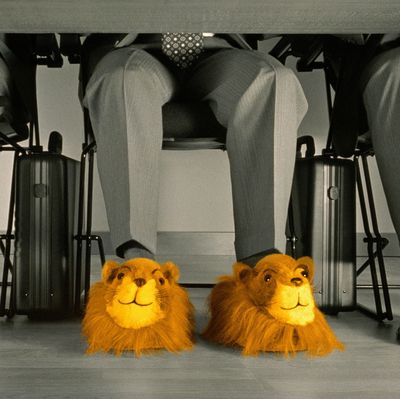
Regardless of your office’s dress code, there’s something to be said for showing up at work in a power suit. The clothes, to a certain extent, make the employee: Past research has shown that dressing more formally can help you focus, make you more confident, and even give you an edge in abstract, big-picture thinking.
This last one, though, was a relative effect: People who dressed more formally at work became better at thinking abstractly, but only when they were more dressed up than everyone around them. And in that regard, the opposite tack — skewing way more casual than your co-workers — has its benefits, too: The Association for Psychological Science blog recently highlighted the “red sneakers effect,” in which people who flout the workplace dress code are actually seen as more competent at their jobs.
The term was coined by a team of Harvard Business School researchers in a 2014 study on conformity in clothing choices. In one part of the study, the authors described two male college professors – one clean-shaven and dressed in a suit, the other with a beard and a T-shirt – and asked college students to rate each man’s skills as a teacher and researcher. True to what the authors had observed in their field study, the students thought more highly of the casual professor — but only when the descriptions mentioned that the professors worked at prestigious universities with formal dress codes. In other words, it wasn’t the casual dress itself that inspired more confidence; it was the nonconformist attitude that the casual outfit signified — which, in turn, is seen as a “reflect[ion of] high levels of autonomy and control.”
It’s not just perception, either; in another experiment, the APS blog noted, the study authors tested their idea in the wild, attending an academic conference and making note of the outfits:
Generally, attendees dress in more formal business attire for these events, including blazers, collared shirts, or dresses. The researchers devised a ratings system to categorize how formally individuals were dressed, and rated the attire of 76 randomly selected conference attendees. The researchers then looked up the number of publications for each scholar included in the sample as a measure of status within the academic community. After controlling for the attendees’ gender, age, and years since receiving their PhD, the researchers found that wearing jeans and a t-shirt (a more non-conforming style) to a conference was significantly correlated with research productivity.
Even if you’re not actually at the top of your workplace food chain, though, it’s never a bad idea to try faking it till you make it, sartorially speaking. The key, the Harvard researchers noted, is to make sure your relative schlubbiness looks intentional: “I haven’t done laundry in weeks and these are my only clothes” is a very different vibe than “I’m wearing that hoodie because I do what I want.” One is kind of sad; the other is a total power move — a counterintuitive one, maybe, but a power move nonetheless.




